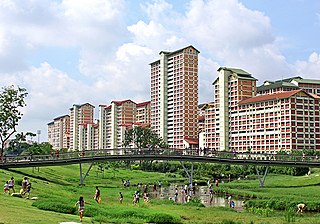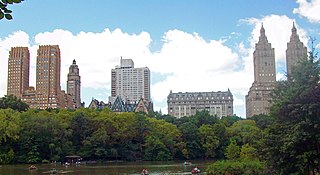
Public housing is a form of housing tenure in which the property is usually owned by a government authority, either central or local.
A condominium is a building structure divided into several units that are each separately owned, surrounded by common areas that are jointly owned.

Plattenbau is a building constructed of large, prefabricated concrete slabs. The word is a compound of Platte and Bau (building). Such buildings are often found in housing development areas.

A housing cooperative, or housing co-op, is a legal entity, usually a cooperative or a corporation, which owns real estate, consisting of one or more residential buildings; it is one type of housing tenure. Housing cooperatives are a distinctive form of home ownership that have many characteristics that differ from other residential arrangements such as single family home ownership, condominiums and renting.

A tenement is a type of building shared by multiple dwellings, typically with flats or apartments on each floor and with shared entrance stairway access, on the British Isles notably common in Scotland. In the medieval Old Town, in Edinburgh, tenements were developed with each apartment treated as a separate house, built on top of each other. Over hundreds of years, custom grew to become law concerning maintenance and repairs, as first formally discussed in Stair's 1681 writings on Scots property law. In Scotland, these are now governed by the Tenements Act, which replaced the old Law of the Tenement and created a new system of common ownership and procedures concerning repairs and maintenance of tenements. Tenements with one or two room flats provided popular rented accommodation for workers, but in some inner-city areas, overcrowding and maintenance problems led to slums, which have been cleared and redeveloped. In more affluent areas, tenement flats form spacious privately owned houses, some with up to six bedrooms, which continue to be desirable properties.

The New York City Housing Authority (NYCHA) is a public development corporation which provides public housing in New York City, and is the largest public housing authority in North America. Created in 1934 as the first agency of its kind in the United States, it aims to provide decent, affordable housing for low- and moderate-income New Yorkers throughout the five boroughs of New York City. NYCHA also administers a citywide Section 8 Leased Housing Program in rental apartments. NYCHA developments include single and double family houses, apartment units, singular floors, and shared small building units, and commonly have large income disparities with their respective surrounding neighborhood or community. These developments, particularly those including large-scale apartment buildings, are often referred to in popular culture as "projects."
Equity Residential is a publicly traded real estate investment trust that invests in apartments.

Orco Property Group S.A. is a real estate development company founded by Jean-François Ott based in Luxembourg, listed on the Euronext in Paris, Prague, Warsaw and Budapest Stock Exchange, it is a subsidiary of CPI Property Group.
Covivio, formerly Foncière des Régions, is a European investment and development company with business activities encompassing office real estate (46%), hotels (26%) and residential accommodation (26%). Europe's fourth-largest real estate investment trust (REIT), its portfolio is worth an estimated €23 billion. Two thirds of the portfolio is divided between Paris, Berlin and Milan, with an occupancy rate of 98.1%.

Airbnb, Inc. is an American company that operates an online marketplace for lodging, primarily homestays for vacation rentals, and tourism activities. Based in San Francisco, California, the platform is accessible via website and mobile app. Airbnb does not own any of the listed properties; instead, it profits by receiving commission from each booking. The company was founded in 2008 by Brian Chesky, Nathan Blecharczyk, and Joe Gebbia. Airbnb is a shortened version of its original name, AirBedandBreakfast.com.
Rubin "Rubie" Schron is a New York City real estate investor, landlord, and the founder of Cammeby's International Group. He owns or controls property worth over $900 million, according to data company Real Capital Analytics. Founded in 1967, Cammeby's portfolio includes office buildings; market-rate and government-subsidized apartment complexes; nursing homes, the 16-building complex in Sunset Park now known as Industry City; a stake in the bottom half of the Woolworth Building; and industrial properties across Long Island. In 2013, Schron made an unsolicited and unsuccessful offer to buy the Empire State Building for $2 billion. In 2003, an investment group led by Schron paid $705.6 million for a portfolio of about 6,000 outer-borough apartments from Donald Trump. Other buildings he owns include the Monterey, a 521-unit rental multifamily building on Manhattan's Upper East Side; over the decades, Schron has also amassed a portfolio of Mitchell-Lama apartment buildings whose values have been skyrocketing to record values, after reverting to market rates when government subsidies expired. In 2007, he sold nearly 4,000 units of former Mitchell-Lama properties in five complexes in Harlem and on Roosevelt Island for $940 million. Schron, who practices Orthodox Judaism, has eight children and 50 grandchildren. He and his family reside in Brooklyn.
Post Brothers is a nationally recognized leader in multifamily development, innovation, and sustainability. Since the company’s founding in Philadelphia in 2006, it has developed or acquired more than 30 properties, and upon completion of its current $1.3 billion owned development pipeline will have developed over 7,000 apartment units with a current portfolio exceeding $1.6 billion. Post Brothers properties to date have all thrived due to a common theme: making a level of upscale, world-class living accessible at a price point that was not previously available. Post Brothers is responsible for many ground-up and adaptive reuse projects, with a more recent focus on newer development. Adaptive reuse projects include the restoration and development of the historic Goldtex building in downtown Philadelphia, the renovation of Rittenhouse Hill, a 624-unit project in East Falls, Presidential City, a $200-million redevelopment of the historic 1,000-unit complex on City Avenue, The Atlantic, now considered the crown jewel of Center City Philadelphia and the Avenue of the Arts, The Poplar, a 285 unit apartment redeveloped from a former Strawbridge’s & Clothier warehouse in 2021. Newer ground-up projects include Piazza Alta, an 1,131 unit collection of residences that serve as an expansion to the original Piazza in the center of Northern Liberties and Broad & Washington, a 1,457 unit development that is expected to be the largest development outside of New York in nearly 50 years.
Welltower Inc. is a real estate investment trust that invests in healthcare infrastructure. It ranked 561st on the Fortune 1000 in 2021, and is a component of the S&P 500. As of early 2021, the firm had an enterprise value of $50 billion and is the world's largest healthcare real estate investment trust.

Deutsche Wohnen SE is a German property company, and one of the 30 companies that compose the DAX index. The position in the DAX was reached in June 2020 from previous MDAX position after Lufthansa was downgraded to the MDAX because of losses during the COVID-19 pandemic.
Real estate is property consisting of land and the buildings on it, along with its natural resources such as crops, minerals or water; immovable property of this nature; an interest vested in this (also) an item of real property, buildings or housing in general. In terms of law, real is in relation to land property and is different from personal property while estate means the "interest" a person has in that land property.

William Pears Group is one of Britain's largest property companies, with £6 billion of property in London and south-east England.
Brookfield Property Partners L.P. is a global commercial real estate firm that is a publicly traded limited partnership and a subsidiary of Brookfield Asset Management, an alternative asset management company. Its portfolio includes properties in the office, multi-family residential, retail, hospitality, and logistics industries throughout North America, Europe, and Australia. Its subsidiary Brookfield Properties is responsible for the management of these facilities.

Vonovia is a German real estate company based in Bochum, North Rhine-Westphalia. Its history goes back to Deutsche Annington, which merged with GAGFAH and was subsequently renamed Vonovia. The company currently owns around 400,000 apartments in Germany, Sweden, and Austria, making it a significant market player in these countries. Vonovia is a member of the DAX 40 and STOXX Europe 600 blue-chip indexes.
David J. Adelman is an American businessman and entrepreneur. He is the CEO of Campus Apartments and the co-founder and chair of FS Investments.

The 2021 Berlin referendum, formally referred to as Deutsche Wohnen & Co. enteignen or DW enteignen, was a referendum held in Berlin in 2021. Voters were asked if they approved of the expropriation of the property of private real-estate companies with 3,000 or more units in the city, through public purchases by the Berlin state government. This would affect 243,000 rental apartments out of 1.5 million total apartments in Berlin. The largest such real-estate company is Deutsche Wohnen, for which the initiative is named, followed by Vonovia. In total, the referendum would impact 12 large real-estate companies.











